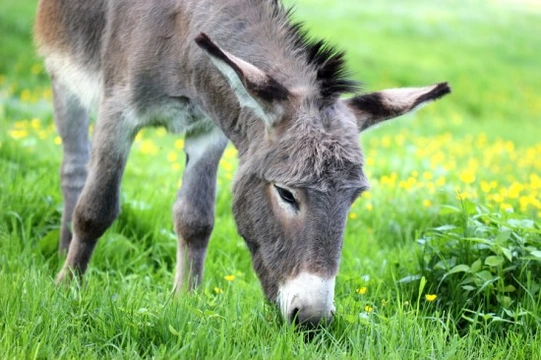
Sharing your life with donkeys
Obstinate, stoic, reliable and uncomplaining - all adjectives that could be used to describe the donkey. Man has been sharing his world with this seemingly-stubborn powerhouse for around 5000 years, and since the donkey was entrusted to carry the Virgin Mary to Bethlehem, our relationship with these steadfast creatures has continued unabated.
Aren't they just a mini horse?
Many people think that a donkey is simply a small horse, but nothing could be further from the truth. They are related to the horse, but like the zebra, the donkey is a completely different species.Although they are members of the equidae family, donkeys are usually much smaller than horses - typically measuring 7:3hh - 14:3hh, weighing anywhere between 80 - 480kg. There are approximately 40million donkeys in the world, with the majority used as working or pack animals in developing countries. Donkeys are usually kept as pets or for breeding in the developed world.
A donkey as a pet?
Of course, if you are thinking about giving a donkey a home you aren't thinking about it curling up on the sofa with you or snuggling up at the end of the bed. Like horses, donkeys have particular needs and these needs must be met in order to ensure a donkey has a healthy, happy life - and that'll be a long life. It's not unusual for a well-cared for donkey to live for 40 years.You should have access to at least one acre of grassland, preferably with a field shelter and some hard standing and you should also have a vet and farrier on speed dial. Donkeys can mean quite a lot of work, but they can also make fantastic companions.
Jacks and Jennies
A female donkey is called a Jenny or a Jennet, while a male is called a Jack. Like horses, a young donkey is a foal. The young of a male horse and a female donkey is a hinny, while the result of a male donkey mating with a female horse is a mule. There have also been incidences of zebra/donkey matings - with the offspring of these unions called zonkeys.The offspring of all donkey/horse hybrids are usually sterile due to chromosomal imbalances.
Basic care
As mentioned earlier, donkeys must have space enough to roam and graze and an acre will be enough for a pair. However, grazing should be monitored closely as donkeys are prone to obesity and laminitis.A field shelter should also be provided so they can get out of the worst of the weather should they wish to, and an area of hard standing should also be available for them to get out of any muddy areas and where you can perform the daily routines of grooming and foot care. If you are riding or driving your donkey the preparation for this can also be performed here.Donkeys are hardy creatures and will live outdoors happily all year round - rugs may be necessary when the temperature plummets or if it gets very wet, but for the most part his thick coat will protect him from the elements provided he is groomed regularly and his coat is kept in good condition.If you obtain a young donkey he may need to be trained to wear a headcollar, walk on a lead rope and stand to have his feet inspected and picked out.
Foot care
Regardless of what you use your donkey for - whether it's for riding, driving or as a companion animal for sheep, goats or horses, keeping its feet in good order is a necessity.The donkey has a tough, elastic hoof which is not as prone to wear as those of horses. Most donkeys are happy barefoot and should be visited by the farrier every six - 10 weeks for trimming and any remedial work. If your donkey is used for driving, riding or any other regular work he may need shoeing. Donkey shoes are similar to those of horses, but differ in that they lack a front clench.
Gut instinct
Originating in the desert plains of Africa, the donkey has evolved to survive on a rather sparse diet - foraging and browsing throughout the day, therefore he should be fed little and often. Grass intake should be watched closely and limited to avoid laminitis, but generally donkeys are good-doers who have a tough digestive system. They suffer less colic than horses and they don't need to eat as much as a horse of comparable height and weight.Dryland pasture works better for donkeys than lush grassland and many people believe straw (barley straw is best) is a suitable diet for these hardy creatures, supplemented with some grazing or hay. Others believe hay and limited grass works best with some cereal or hard feed offered if the animal is in work.A salt and mineral supplement should be included in your donkey's ration and clean, fresh water should always be available.
As stubborn as a mule?
So are they as stubborn as we are led to believe? Well, yes and no. Donkeys do have a reputation for being particularly bloody minded, but experts suggest that this may be down to their innate sense of self-preservation. Their unwillingness to move forward may just be because they sense danger - not because they are being awkward, and as such they may just be protecting you into the bargain.Because of their perceived stronger prey instinct and less-developed connection with man, they are not as easily coaxed as their equine cousins and they cannot be as easily frightened or forced into action. However once you have earned their trust they are trustworthy, dependable companion that can also be playful, curious and eager to learn. And perhaps a bit noisy...



